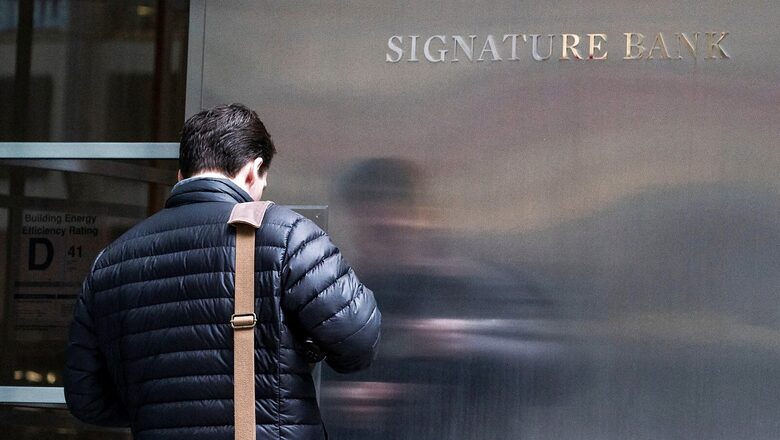
views
VSignature Bank Collapse: US regulators closed New York-based Signature Bank on Sunday, making it the third-largest failure in US banking history. The Federal Deposit Insurance Corporation (FDIC) has formed a bridge bank to handle the accounts of Signature Bank customers.
To some extent, Signature is a victim of the panic around Silicon Valley Bank, which regulators seized on March 10. Its closing underscores the challenges that face small and midsize banks, which often focus on niche lines of business and have a narrower base of customers than Goliaths such as JPMorgan Chase and Bank of America. That leaves them especially vulnerable to old-fashioned bank runs.
The US Treasury Department and other bank authorities declared in a joint statement that “no losses will be borne by the taxpayer” and that all of the depositors of Signature Bank and Silicon Valley Bank will get full compensation.
Signature Bank started operations back in 2001 and grew to become one of the few banks to hold funds from cryptocurrency investors and startups. After the Silicon Valley Bank shut down, Signature Bank’s business customers started enquiring if their deposits were safe as they had more than $250,000 in their accounts while the FDIC only assures funds up to $250,000, reported The New York Times.
Soon, the Signature Bank witnessed a surge in withdrawals as depositors started pulling their money from the lender, the report added, citing a person with knowledge of the matter. The bank also witnessed its stocks tanking along with that of some of its peers.
As per regulatory filings of Signature Bank, more than $79 billion of its total deposits of nearly $88 billion were uninsured at the end of last year. The bank started accepting deposits of crypto assets in 2018 and is likely to have suffered from the collapse of Sam Bankman-Fried’s crypto exchange FTX in November 2022.
Crypto companies helped Signature Bank increase its deposits as the lender’s 27% deposits in early 2022 belonged to digital assets clients. After the FTX crisis, Signature Bank decided to sever ties with some crypto clients but failed to retain investors, according to The Wall Street Journal.
Will Customers Be Able to Access Funds?
The FDIC established a “bridge” successor bank on Sunday which will enable customers to access their funds on Monday. Signature Bank’s depositors and borrowers will automatically become customers of the bridge bank, the FDIC said.
The regulator named former Fifth Third Bancorp Chief Executive Greg Carmichael as CEO of the bridge bank.
Silicon Valley Bank customers will have access to their deposits starting Monday, US officials said on Sunday. The federal government also announced actions to shore up deposits and try and stem any broader fallout.
The shares of Signature Bank slumped 23% on Friday. Anxious customers soon started moving their funds from the lender to other banks amid the panic caused by the SVB collapse.
About Signature Bank and Its Services
The demise of Signature, with assets of under $100 billion, is a blow to many of the professional services firms that have come to rely on it. The bank long specialized in providing banking services to law firms, providing escrow accounts for holding client money and other services.
Scott Shay, Joseph DePaolo and John Tamberlane founded Signature in 1999 with backing from Israel’s biggest lender, Bank Hapoalim. On a personal bio page, Shay described himself as a “thought leader, and author of several widely read books on profound issues facing the Jewish community.” The bank went public in 2004.
One of Signature’s specialties was financing the purchase of taxi medallions, which authorize holders to operate cabs. It was known in New York for providing banking services to law firms and real estate companies, and for catering to wealthy families in the area.
Its clients had included some individuals associated with the Trump Organization, former President Donald Trump’s company. The bank lent money to Jared Kushner, who is Trump’s son-in-law, and to Kushner’s father, Charles. It also helped finance Trump’s Florida golf course.
Over the past decade, Signature had begun to expand its business nationally, and to the West Coast in particular.
Signature Bank had 40 branches across the country in New York, California, Connecticut, North Carolina, and Nevada.
Read all the Latest Business News here




















Comments
0 comment